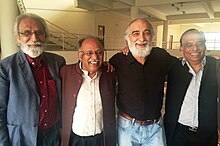Science and technology studies in India
Uberoi,[1][2] Ashis Nandy,[3][4] Vandana Shiva,[5] Claude Alvares[6][7] and Shiv Visvanathan[8][9] However, there is a first generation of scholars from the 1970s who looked at science and technology (and not from the purview of post-Kuhnian STS) such as Dharampal,[10] Abdur Rahman,[11][12] and SN Sen.[13] Works of J.D.
[16] In the 1990s, the field became vibrant with the intervention of a group of social historians of science inspired by postcolonial studies such as David Arnold, Robert S. Anderson, Deepak Kumar,[17] Dhruv Raina,[18] S. Irfan Habib,[19][20] Itty Abraham,[21] Gyan Prakash.
[23] Works of sociologists like Harish Naraindas,[24] VV Krishna,[25][26] V. Sujatha, E.Haribabu and Binaykumar Patnaik also are significant to the development of the field, along with the philosophical enquiries of Prajit K. Basu and Sunder Sarukkai.
In the wake of the 'Sokal Affair' in the western academia, a similar debate was triggered in India, mainly in the pages of Economic and Political Weekly, where Alan Sokal himself participated.
[31] Scholars such as Abha Sur,[32] Amit Prasad,[33] Banu Subramaniam, Esha Shah,[34] Gita Chadha, Indira Chowdhury[35] Jahnavi Phalkey,[36] Kaushik Sunder Rajan,[37] Kavitha Philip,[38] John Bosco Lourdusamy, Senthil Babu, Rohan D'Souza, Saradindu Bhaduri, Madhav Govind and Pratik Chakrabarti[39] represent the next generation of scholars in the field who became active in the 2000s.
